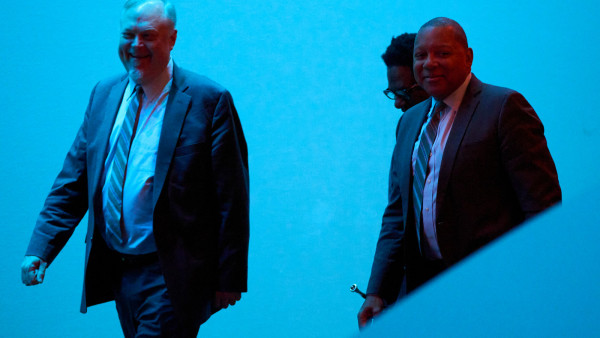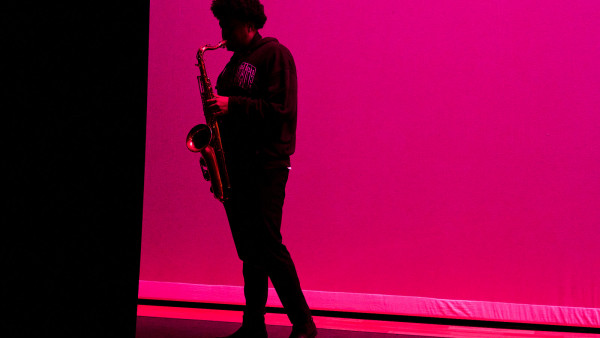Wynton Marsalis and Jazz Orchestra of Lincoln Center return to Denver
The last time Wynton Marsalis and members of the Jazz at Lincoln Center Orchestra were in town, well, they weren’t exactly in town. Instead of taking to the Newman Center stage last spring as had been the plan, they performed “Democracy Suite!” virtually.
If you go
Jazz at Lincoln Center Orchestra with Wynton Marsalis, Feb. 19 and 20, at the Robert and Judi Newman Center at the University of Denver, 2344 East Iliff Ave. Tickets and information at newmancenterpresents.com or 303-871-7720.
Marsalis composed the work as a can-do, must-do response to the calls of 2020’s social justice protests and the coronavirus pandemic. His father, renowned jazz pianist Ellis Marsalis Jr., died of COVID-19 complications in April 2020. And though the show was virtual, it was still one of the highlights of last year’s upended performance season.
Next weekend, Marsalis and the orchestra head to the Newman Center, this time in person. The nine-time Grammy trumpeter, composer and cultural steward took time out of the orchestra’s formidable touring schedule to talk via Zoom about hanging out with his father and other musicians in New Orleans, about the music he loves, the ethic it’s engendered and collaboration.
Q: Last summer you performed with the Tulsa Symphony Orchestra and Festival Chorus to mark the centenary of the Tulsa Race Massacre. What do you think about jazz’s relationship to resilience and trauma?
A: The music is a tool for survival, but it comes with a reality. The musicians are not about victimhood; they’re about solving problems. And the music arms us to solve problems. Music makes you deal with yourself and with things in a very real way. It pulls the covers off of you first, because to improvise, you got to look at yourself.
Q: You’ve collaborated across many art forms. What makes for good collaboration?
A: If you share fundamental objectives with whoever you’re collaborating with, that’s first. Then making the mechanics of the different styles come together. After that, there’s a poetic understanding of the meaning of the form so that you’re not sacrificing the meaning of something to collaborate.
Q: I think of you as a humanist, but one who has an understanding of the differences between us.
A: Yeah. I believe in universal humanism — that’s what my father believed in it. It’s not something that I came to. I was lucky to be raised with him. That was his true belief.
Q: For decades, you’ve made an eloquent argument about classical jazz, not in a precious way but as a vibrant, living relationship that continues onward.
A: For me, it just ties into the larger cultural, national dialogue around disliking your parents.
Q: And you always show so much love for your dad.
A: I never had to eat my parents to be full. My household was people struggling and I was always on gigs with my father and them, but they were struggling. Most of the time, people don’t rebel against people who are really struggling. They see that the struggle that they have on Earth is already enough.
Q: When did the turning point come in terms of the music?
A: My attitude about the music was I couldn’t play it — it was difficult music — but I wanted to help them. I wasn’t interested in rebelling. They were struggling enough. And it was so difficult for them without a lot of people to take gigs. Even though a lot of times I didn’t understand what they were saying. I mean, him and the four or five other jazz musicians — all great musicians, but certainly not making money and not known, like Alvin Batiste, Nat Perrilliat, James Black. And I identified with this struggle. But it was always curious to me: Why would a group of people want to play something no one wants to hear? I joined a funk band when I was 13 and we always had way more people than my father had.
Q: Sounds like it made you an old soul, sitting in the room with those guys.
A: Not that I could play, but I was always around them. I was always the only kid in the club. I always identified with them, even though I didn’t necessarily identify with the music. So once I started to listen to John Coltrane and the people they liked — none of my friends knew that kind of music or were into it – then I started to say, “Man, I wonder if I could learn how to play like Clifford Brown?” By that time in the ‘70s, we didn’t really know any of that. Right? Because I was with my father, I did know. I did know who Duke Ellington was. None of my friends did; we were playing Earth, Wind & Fire.
Q: Given all that struggle, what was the turning point for you?
A: How great the music was. This music is great. It’s what my father was always saying. Sometimes whole groups of people can lose the meaning of who they are, and you have to hold onto it yourself.
Q: You and the orchestra have a set of core beliefs based on jazz. What are they?
A: Well, there are three basic things that music teaches you. One, improvisation. It gives you a sense of self-worth and freedom to believe in and express your true identity. You don’t have to be in a clan. Then, the second is the opposite of that. It comes out of swinging, which is that you have to find some type of common ground or balance, because that’s what you are able to do, reconcile the opposite to these different points of view. That’s the part that we struggle with the most because you have to constantly search for balance and equilibrium. And if you achieve it for one minute, it doesn’t mean you’re going to achieve it in the second minute. Swing is a concept. It means we all figure out how to work together. And sometimes it means we sacrifice the desires of ourselves or our group to find a larger kind of common ground. And then the third comes through the blues, which is just a die-hard resilience.
Q: What are people going to hear at the Newman Center?
A: Before this tour, I called every member of the Orchestra and said, pick three arrangements or songs that we played that are the most meaningful to you. We have some music from Chick Corea — he played with us a lot and he recently passed. We have original compositions I’ve done and that members of the orchestra have done. We have Monk’s music. We have Sonny Rollins’ “Freedom Suite.” We have a lot of other pieces that I think people will enjoy the way that we play the music because we’re playing it with a lot of belief.
by Lisa Kennedy
Source: Denver Post


